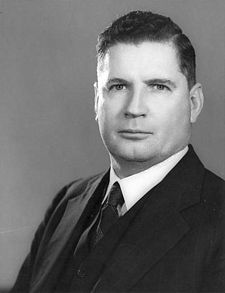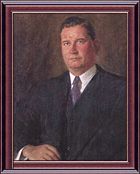Arthur Fadden
|
The Right Honourable
Sir Arthur Fadden GCMG |
|
 |
|
|
13th Prime Minister of Australia
Elections: 1943 |
|
|---|---|
| In office 29 August – 7 October 1941 |
|
| Preceded by | Robert Menzies |
| Succeeded by | John Curtin |
| Constituency | Darling Downs (Queensland) |
|
|
|
| Born | 13 April 1894 Ingham, Queensland, Australia |
| Died | 21 April 1973 (aged 79) |
| Political party | Country |
Sir Arthur William Fadden, GCMG (13 April 1894–21 April 1973), Australian politician and 13th Prime Minister of Australia, born in Ingham, Queensland, the son of a Presbyterian police officer.
Contents |
Biography
Fadden was educated at state schools, and later studied accountancy while working as a clerk. Once he had qualified he became assistant Town Clerk of Mackay, then Town Clerk. In 1919 Fadden helped form the North Queensland Rugby League, and served as its founding secretary.[1] In the 1920s he established a successful accountancy firm with offices in Brisbane and Townsville. He was active in the Country Party from its foundation.
In 1932 Fadden was elected for one term to the Queensland Legislative Assembly. He was defeated in 1935 but the following year he won a by-election in the federal seat of Darling Downs. He was a blunt, effective debater and soon made an impression. When Archie Cameron resigned suddenly as Country Party leader in 1940, there was a deadlock between Earle Page and John McEwen in the ballot to replace him, and Fadden was chosen as a compromise candidate. He was appointed Minister for Supply and Development, then Minister for Air, then Treasurer (finance minister).
In August 1941 Robert Menzies resigned as Prime Minister. The United Australia Party (UAP) was so bereft of leadership at this time that Fadden was invited to become Prime Minister, although the Country Party was the smaller of the two conservative parties. But on 3 October the two independent MPs (Arthur Coles and Alex Wilson) who were keeping the government in office were so disgusted at the way Menzies had been treated that they voted against Fadden's budget, and Fadden submitted his government's resignation to the Governor-General Lord Gowrie later that day. This was the last occasion to date on which defeat on the floor of the House of Representatives obliged a government to resign.[2] Fadden joked that he was like the Flood: he had "reigned for 40 days and 40 nights". Gowrie then commissioned the Labor leader John Curtin to form a government, but only after sending for Coles and Wilson and demanding that they give him a guarantee that, if he commissioned Curtin, they would support him and end the instability in government. Curtin's Labor ministry was sworn in on 7 October.
Fadden continued as Opposition Leader, leading the conservatives to a crushing defeat in the 1943 election. He then handed the Opposition leadership back to Menzies and his new Liberal Party, while remaining Country Party leader. Always an outspoken conservative, in the late 1940s he became a strong anti-communist, urging Menzies to ban the Communist Party. After the 1946 election, Fadden resumed his political partnership with Robert Menzies, though still keen to assert the independence of his party. Indeed, in the lead up to the 1949 federal election, Fadden played a key role in the defeat of the Chifley Labor government, frequently making inflammatory claims about the "socialist" nature of the Labor Party which Menzies could then "clarify" or repudiate as he saw fit, thus appearing more "moderate". His often-extreme political views were concealed behind a jolly public manner and he enjoyed his nickname "Artie."
In 1949 Arthur Fadden became Treasurer in the second Menzies government. Although inflation was very high in the early 1950s, forcing him to impose several "horror budgets," he generally presided over a booming economy, with times especially good for farmers. He retired before the 1958 general election and lived quietly until his death in Brisbane, Queensland in 1973.
Fadden was made a Knight Commander of the Order of St Michael and St George (KCMG) in 1951,[3] and in 1958 was raised to Knight Grand Cross (GCMG) of the order.[4] The Canberra suburb of Fadden and the Division of Fadden are named after him.
Fadden Ministry


29 August 1941 to 7 October 1941
- Rt Hon Arthur Fadden, MP: Prime Minister, Treasurer (CP)
- Rt Hon Billy Hughes, MP: Attorney-General, Minister for the Navy (UAP)
- Rt Hon Robert Menzies, KC MP: Minister for Defence Co-ordination (UAP)
- Hon Percy Spender, KC MP: Minister for the Army (UAP)
- Senator Hon George McLeay: Vice-President of the Executive Council, Minister for Supply and Development (UAP)
- Hon John McEwen, MP: Minister for Air, Minister for Civil Aviation (CP)
- Senator Hon Hattil Foll: Minister for the Interior, Minister for Information (UAP)
- Rt Hon Sir Earle Page, GCMG MP: Minister for Commerce (CP)
- Hon Sir Frederick Stewart, MP: Minister for External Affairs, Minister for Health, Minister for Social Services (UAP)
- Senator Hon Philip McBride: Minister for Munitions (UAP)
- Hon Eric Harrison, MP: Minister for Trade and Customs (UAP)
- Hon Harold Holt, MP: Minister for Labour and National Service (UAP)
- Senator Hon Herbert Collett: Minister for Repatriation (UAP)
- Hon Thomas Collins, MP: Postmaster-General (CP)
- Senator Hon John Leckie: Minister for Aircraft Production (UAP)
- Hon Larry Anthony, MP: Minister for Transport (CP)
- Hon Eric Spooner, MP: Minister for War Organisation of Industry (UAP)
- Hon Joe Abbott, MP: Minister for Home Security (CP)
- Hon Allan MacDonald, MP: Minister for External Territories (UAP)
References
- ↑ http://rl1908.com/History/prime-ministers.htm
- ↑ Gavin Souter, Acts of Parliament, p. 341
- ↑ It's an Honour - Fadden KCMG
- ↑ It's an Honour - Fadden GCMG
Further reading
- Arthur Fadden, They Called Me Artie, Jacaranda Press (1969)
External links
- Arthur Fadden - Australia's Prime Ministers / National Archives of Australia
| Political offices | ||
|---|---|---|
| Preceded by James Fairbairn |
Minister for the Air Minister for Civil Aviation 1940 |
Succeeded by John McEwen |
| Preceded by Robert Menzies |
Treasurer of Australia 1940 – 1941 |
Succeeded by Ben Chifley |
| Prime Minister of Australia 1941 |
Succeeded by John Curtin |
|
| Preceded by John Curtin |
Leader of the Opposition 1941 – 1943 |
Succeeded by Robert Menzies |
| Preceded by Ben Chifley |
Treasurer of Australia 1949 – 1958 |
Succeeded by Harold Holt |
| Parliament of Australia | ||
| Preceded by Littleton Groom |
Member for Darling Downs 1936 – 1949 |
Succeeded by Reginald Swartz |
| New division | Member for McPherson 1949 – 1958 |
Succeeded by Charles Barnes |
| Party political offices | ||
| Preceded by Archie Cameron |
Leader of the Country Party 1940 – 1958 |
Succeeded by John McEwen |
|
|||||
|
|||||